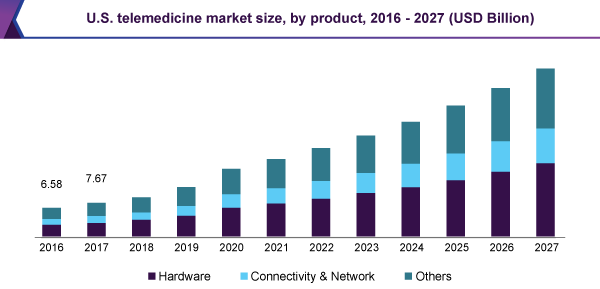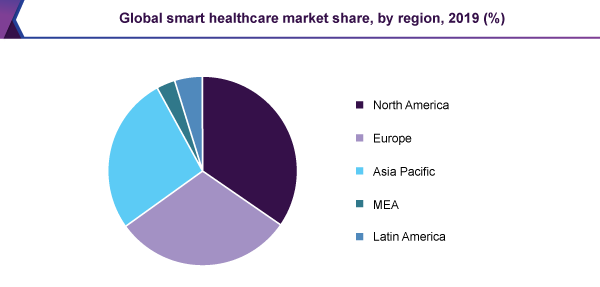- US: +1-408-610-2300
- Toll Free: +1-866-831-4085
- Become a Client
The global smart healthcare market was prized by USD 143.6 billion in 2019. It is estimated to witness a 16.2% CAGR from 2020 to 2027.
The rising occurrences of chronic sicknesses, increasing acceptance of mHealth, and government plans to digitize healthcare are the factors, expected to highlight the requirement for smart healthcare systems.

Mainly, due to the increasing utilization of smartphones and digitization, the acceptance of mHealth has considerably augmented, during the previous only some years. Digitalization has altered the healthcare business.
As indicated by the United Healthcare Consumer Sentiment Survey, roughly 37.0% of Americans trust mobile apps otherwise the internet, for the consultations linked with their physical conditions, in 2019.
Increasing partaking from the companies is anticipated to, additionally, power enlargement of the smart healthcare market. For example, Phillip had presented a fresh appliance for the eCare Manager Insight sourced marking apparatus, to inspect the patient situations to find out weakening or some unfavorable developments, associated with Covid-19, in April 2020.
In the same way, Teladoc Health presented Teladoc medicinal experts, meant for the patients undergoing the conditions of physical fitness and complex mental situations, in October 2019.
This is proposed to incorporate easily, the specialist medicinal services plus the medical doctors together with their patients. These types of progressions are estimated to propel the market, during the forecast period.
In 2019, mHealth held approximately 47.0% revenue share of the smart healthcare market, based on the product. The implementation of mHealth apps, higher utilization of internet and the smartphones, are the factors, which can be credited to the domination of mHealth. The presentation of wearable devices from the companies like MI, Apple, and Fitbit are furthermore optimistically impacting the market.
A Canadian company, Proxxi, introduced a wearable device named Halo, in April 2020. This gadget is intended to make sure conformity by social distancing, on a place of work in the current Covid-19 pandemic, all over the world. This gadget would continually inform, regarding the severance, to guarantee appropriate social distancing.
By 22.1% CAGR, the RFID kanban system is the highest increasing sector, during the forecast period. The important development helping in the recognition of RFID is tracking of assets, automation, real-time intelligence, plus supply chain management.
The technology of RFID assists to recognize problems in the hospital workflow, particularly to speedily and extra professionally shift the patients, in and out. RFID in Real-Time Location Systems (RTLS) furthermore assist to follow newborn children. Therefore, because of the abovementioned grounds, the section is expected to develop, throughout the forecast period.
Telemedicine is the subsequent highest-rising sector in the smart healthcare market. It is expected to increase the acceptance and the use of telemedicine, via healthcare experts to successfully link up with their patients, on the backdrop of continuing the Covid-19 pandemic. Delivery of virtual treatment is increasing like an effectual resolution for the safe as well as better contact, due to the global requirements of social distancing.
Besides, the companies are working together with hospitals to check the patients of Covid-19. For example, the All India Institute of Medical Sciences (AIIMS) started a 24/7 Telemedicine Hub, CoNTeC, in March 2020. It is an instantaneous telemedicine hub, intended to help the doctors of medicine, to take care of the patients.
In 2019, North America held a 34.81% revenue share and led the global smart healthcare market. This is credited to encouraging strategies, adopted by the government authorities for the use of digital healthiness along with the convenience of infrastructure by way of elevated digital literacy.

Besides, increasing alertness regarding connected healthcare, use of fitness-associated apps, greater infiltration of the smartphones and internet, the existence of important market contestants, are some of the important factors, accountable for the enlargement of the market.
Due to its superior health care assessment, and affordability, almost 76.0% of hospitals in the U.S. make use of tele healthiness to get in touch with the patients and consulting practitioners. This information was given by the American Hospital Association (AMA), in March 2020. The flourishing realization of Electronic Health Records (EHR) and e-prescription systems, in diverse healthcare centers, push the expansion of the local market for smart healthcare.
The Asia Pacific is anticipated to display profitable enlargement, during the forecast period. The nations like, India, Japan and Australia demonstrate large prospective because of their developed infrastructure of healthcare IT plus increasing funds in smart healthcare.
Commencement in the number of digitalization plans by the governments, in the budding nations like India and China, is estimated to push the acceptance of digital healthcare resolutions like health services.
The companies are investing, evermore, in telemedicine services amid the rising cases of Covid-19, within the region. This is projected to augment the acceptance of telemedicine exercise to battle the Covid-19 pandemic, within the region.
The companies are taking on a variety of tactical plans like the partnerships, presentations of new products, joint ventures, and mergers & acquisitions to get additional access in the market.
• Wurth Group
• Stanley Innerspace
• Siemens Medical Solutions
• Pepperl+Fuchs
• McKesson Corporation
• IBM
• Given Imaging, Inc.
• Cisco
• Brooks Automation
• Apple Inc.
• AirStrip Technologies Inc.
• Bollhoff Group
• Solstice Medical LLC
• Samsung Electronics Corporation
• Olympus Corporation
• Logi-Tag
• Hurst Green Plastics Ltd.
• GE Healthcare
• Cerner Corporation
• AT&T Inc.
• All scripts Healthcare Solutions
|
Report Attribute |
Details |
|
The market size value in 2020 |
USD 185.3 Billion |
|
The revenue forecast in 2027 |
USD 528.9Billion |
|
Growth Rate |
CAGR of 16.2% from 2020 to 2027 |
|
Base year for estimation |
2019 |
|
Historical data |
2016 - 2018 |
|
Forecast period |
2020 - 2027 |
|
Quantitative units |
Revenue in USD Million and CAGR from 2020 to 2027 |
|
Report coverage |
Revenue forecast, company ranking, competitive landscape, growth factors, trends |
|
Segments covered |
Product, region |
|
Regional scope |
North America; Europe; Asia Pacific; Latin America; and Middle East & Africa |
|
Country scope |
U.S; Canada; U.K.; Germany; France; Italy; Spain; Japan; China; India; Australia; South Korea; Brazil; Mexico; Argentina; South Africa; Saudi Arabia; UAE |
|
Key companies profiled |
IBM; Cisco; GE Healthcare; Olympus Corporation; Brooks Automation; Given Imaging, Inc.; Stanley Innerspace; Solstice Medical LLC; Siemens Medical Solutions; Allscripts Healthcare Solutions; Samsung Electronics Corporation; AirStrip Technologies Inc.; Apple Inc.; AT&T Inc.; Logi-Tag; Cerner Corporation; Pepperl+Fuchs; Hurst Green Plastics Ltd.; Bollhoff Group; Wurth Group; McKesson Corporation; Brooks Automation; and LogTag |
|
Customization scope |
Free report customization (equivalent to up to 8 analysts working days) with purchase. Addition or alteration to country, regional & segment scope. |
|
Pricing and purchase options |
Avail of customized purchase options to meet your exact research needs. |
This report forecasts revenue growth at global, regional, and country-level and provides an analysis of the latest industry trends in each of the sub-segments from 2016 to 2027. For this study, Million Insights has segmented the global smart healthcare market report on the basis of product and region:
• Product Outlook (Revenue, USD Million, 2016 - 2027)
• RFID Kanban Systems
• RFID Smart Cabinets
• Electronic Health Records (EHR)
• Telemedicine
• mHealth
• Smart Pills
• Smart Syringes
• Regional Outlook (Revenue, USD Million, 2016 - 2027)
• North America
• The U.S.
• Canada
• Europe
• The U.K.
• Germany
• France
• Italy
• Spain
• Asia Pacific
• Japan
• China
• India
• Australia
• South Korea
• Latin America
• Brazil
• Mexico
• Argentina
• Middle East & Africa
• South Africa
• Saudi Arabia
• UAE


Research Support Specialist, USA